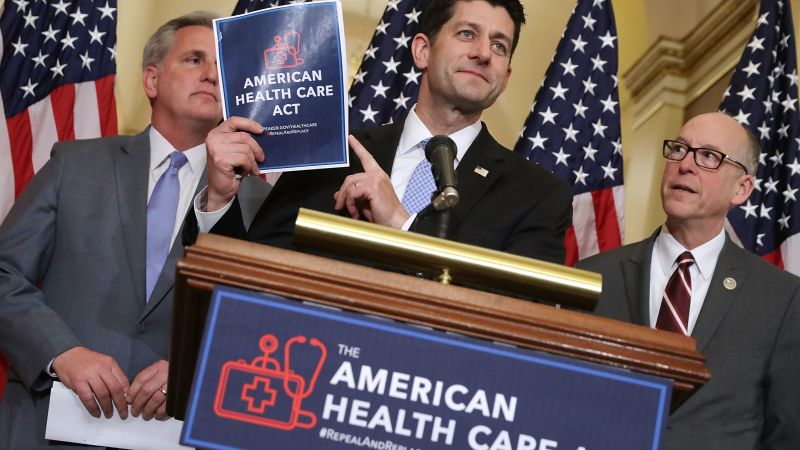While Donald Trump presides over this poorly produced reality show that we call a presidency, we must admit that it has been extraordinarily entertaining so far. Although the thrilling tales about the administration’s secret Russian rendezvous and Trump’s paranoid schizophrenic late-night tweets about dead people voting and phone tapping keep us glued to our favorite cable news channels, they don’t really influence the bottom-line lives of the average American. When—not if—we find out that Trump is actually a Russian cyborg who runs off a tanning bed power charger buried in the basement of his Mar-a-Lago resort, we will be neither surprised nor adversely affected.
But the American Health Care Act is a different story.
The House Republicans’ plan to repeal and replace the Affordable Care Act is making its way through Congress, slowly garnering the support of skeptical conservatives hell-bent on stripping away access to health care for the 2o million people insured under Obamacare. To save your retinas from burning from acute overexposure to bullshit, The Root pored through every word of this dumpster fire of a legislative proposal to answer all of your questions about what it means to you.
Here are the answers to the most important questions regarding the bill:
What is Trumpcare?
The American Health Care Act is the Republican version of the Affordable Care Act. Like most legislation, it is a bill that began in the House of Representatives. Unlike most legislation, however, there was no debate on the House floor. It was written behind closed doors by a select group of Republicans to replace Obamacare while they snorted cocaine and took shots of Russian vodka.
You’re probably saying, “I doubt they drank and did coke,” but how do you know? It was behind closed doors. Plus, I’ve read the bill, and I’m not so sure.
Why does Obamacare need replacing?
That is a complex question. Conservatives have a number of problems with the Affordable Care Act. They don’t like the “socialist” aspects of the law. To be fair, the ACA is socialist—as are many other American programs, including public schools, fire departments, public libraries, roads and police departments.
They also cite the costs of Obamacare and that it is an entitlement program. Republicans hate entitlements—unless you count corporate welfare, farm subsidies, international aid and various tax loopholes. They always ignore one etymological fact: It is our money; therefore, we are “entitled” to it.
But the biggest, most egregious problem with Obamacare is the “Obama” part. After Osama bin Laden was killed, two wars were winding down and the economy was recovering from the biggest recession since the 1920s, Republicans needed a villain to run against, and they chose Obamacare. For eight years they promised to repeal and replace it, figuring they’d never have to come up with an actual alternative, because the next president would veto their proposals. The only way their ingenious plan would fail was if, instead of selecting a public servant with 50 years of public service, America chose a reality-show assclown to serve as president.
That could never happen.
Will my insurance cost more?
Are you rich? Then probably not. Trumpcare would cut the tax bills of the 400 richest American families by $7 million and give $346 billion in tax breaks to individuals making $200,000 or more.
Are you middle class or poor? Then probably. If the law goes into effect, the costs to poor and middle-class families will increase by at least $1,542 per year.
Are you old? Then yes. If the AHCA replaced Obamacare today, people ages 55-64 would see an average increase of $5,269.
The Republican proposal seeks to “expand the marketplace,” allowing you to purchase health care across state lines, anywhere you want. This is all part of the “free market” ideology that conservatives love to explain everything from why rich people need tax breaks to why it’s OK for bakeries to discriminate against gay people.
Most economists, however, believe that the ACHA’s dropping of the individual mandate will raise the costs of insurance across the board, because it removes younger, healthier people from the pool of people paying for insurance. Trumpcare relies heavily on tax credits—the agreement that you will pay for your insurance up front and the IRS will refund you up to a certain amount at the end of the year.
Because if ol’ bankrupt Trump is known for anything, it’s his willingness to pay people what he owes them.
Will I lose my insurance under the American Health Care Act?
You might. The Congressional Budget Office is expected to announce that it expects 15 million people to lose coverage under Trumpcare. The American Health Care Act won’t require as many employers to cover their workers, and it won’t continue Medicaid expansion.
But how will they pay for it?
Magic.
Many critics say that removing the individual mandate and mandatory employer coverage and giving tax breaks to everyone cannot pay for insurance. Those people forget that even when conservatives bellow on and on about the deficit and reducing spending, they don’t actually care about these things when it comes to something they want. They use a force more powerful than math and data, because they know Jesus will fix it.
Is there anything good about Trumpcare?
Yes, there is. Young, healthy people won’t be forced into buying health insurance. The ACHA also continues to force insurance companies to cover pre-existing conditions. Although it won’t enroll new patients into Medicaid expansion, it will continue to cover those who are already insured. Like the Affordable Care Act, it still allows parents to cover their children through age 25.
This sounds a lot like Obamacare.
In many ways it is Obamacare lite. It keeps many of the most popular provisions of the Affordable Care Act because Republicans are tired of being screamed at by angry housewives at town hall meetings. People don’t want to lose their health insurance, and they are letting their representatives know.
So why repeal something that people seem to like?
What else are Republicans going to do? Should they hold hearings on trumped-up claims of wiretapping? Investigate their fellow party members’ ties to Russia? Bankrupt America by building a border wall that won’t actually stop anyone from coming into the country?
Nah, they said they’d do this, and they are doing it.
What happens now?
There are three more steps in this process:
1. Pass the bill through the House. The Republicans must take this bill and add provisions that will appease the base of their party. Right now the Freedom Caucus—the most virulently right-wing, conservative (pronounce “ray-sist”) members of the House of Representatives—still feels that the AHCA is too much like Obamacare. Republican leaders will have to increase tax credits and strip away some of the rational provisions of the bill.
2. Take it to the Senate. By the time it gets to the Senate for what they call “reconciliation,” the American Health Care Act will be a right-wing, tax credit giveaway to the rich that has no language about health care. By then, Trumpcare might offer coverage to 11 people: six Kardashians and a family of five in Wyoming.
Democrats and moderate Republicans in the upper chamber will take one look at it and refuse to vote for the AHCA, and it will die a quiet, bloody death on the Senate floor.
3. Republicans will say “fuck this.” After they experience how hard it is to pass reasonable health care reform, conservatives will acknowledge (not publicly) that Obamacare is the only reasonable way to offer Americans health care. Upcoming midterm elections will force them to fix the problems in the Affordable Care Act, just as they did with Social Security, Medicare, Medicaid and every other entitlement program.
But it will be too late. By then, cyborg Trump will have already turned America’s nuclear arsenal over to Russia, and Vladimir Putin will have us all enduring the effects of nuclear winter in a postapocalyptic Hunger Games free-for-all.
Does Obamacare cover radiation fallout?
Source: We Read All 123 Pages of Trumpcare; Here’s What You Need to Know
Photo: Speaker of the House Paul Ryan (R-Wis.), center (Chuck Somodevilla/Getty Images)




